Report on Sustainable Development
GOAL 10 REDUCED INEQUALITIES
Reduce inequality within and among countries
1
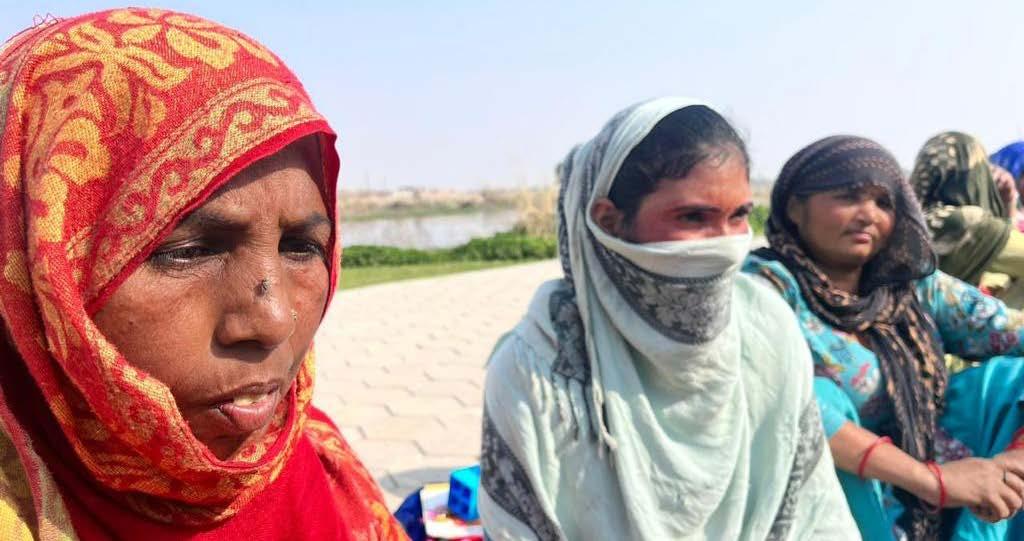
Sustainable Development Goal 10 is about reducing inequalities, ensuring opportunities, ending discrimination, and promoting universal social, economic, and political inclusion. Education Institutions, in this sense, are dynamic places where the issues of inequalities are debated, knowledge is created and innovative ways are evoloved to address these issues.
At Shiv Nadar, we bring goal 10 to life in many creative ways – teaching, research, university practices, and partnerships. Here is a glimpse of our work.
1 Teaching and Learning
The School of Humanities and Social Sciences has many departments which offer courses for undergraduate and graduate students, such as, Growth and Inequality (ECO 425), Poverty and Inequality (ECO 392), Hierarchy, Difference, Inequality (SOC 120), Issues in Water Policy, Discrimination, Exclusion, and Conflicts (WSP510), Economics of Discrimination (ECO 684), Economic Development (ECO 415), Interrogating Histories and Theories of Economic Development (INT
202), Development Economics (ECO 605), Education for Sustainable Development (SWE 313). We also offer meaningful education around sustainability and related areas to all students across the University, such as Environmental Studies (CCC 704), Environmental Impact Assessment (CCC 406), Energy for Sustainable Future (CCC 614), and Green Energy Technologies (CCC613) and many more.
Besides, all undergraduate students in the School of Management and Entrepreneurship undertake Social Sector Internship (SSI). This is a project that all undergraduate students, without exceptions, go through in the School of Management and Entrepreneurship at Shiv Nadar University. In this
program, students undergo a rigorous 8-week on-site internship immersion in rural and non-urban ecosystems. During their tenure, our students work with local indigenous communities to ameliorate social enterprise challenges or create growth models for the social sector. Many projects touch on various. facets of goal 10.
For example, Aman Sarda, for his SSI project, worked with an NGO, Apnalaya, in their health and disability program and conducted extensive field visits. Darsh Oswal worked with CORD India, visited villages, identified specially-abled people, and linked them with pension plans. He also did an impact assessment and created an impact report on their livelihood program.
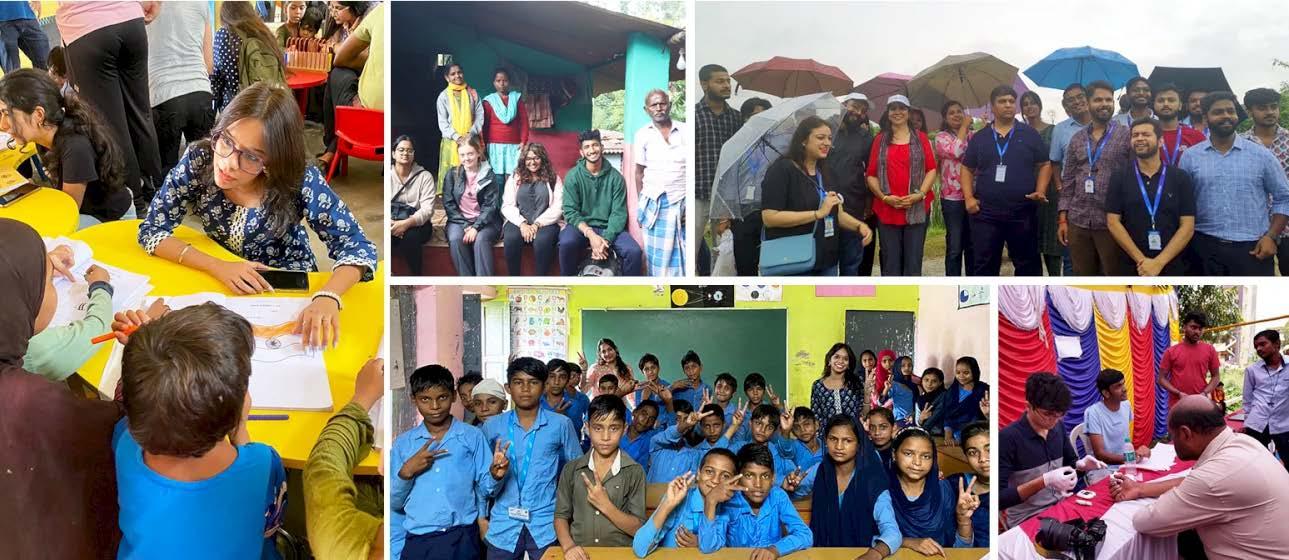
2
2 Research
Assistive Technology
The Department of Design at Shiv Nadar works extensively in assistive technology1. Prakash Kumar, Associate Professor, Vikash Kumar, and Subajit Chandra, Assistant Professors, Department of Design, incorporate assistive technology in creating products, services, or spaces that are accessible, inclusive, and user-friendly, such as Mobility aids that aim to enhance user’s experience, comfort, and safety while facilitating their movement and daily activities., like, wheelchairs, walkers, canes, crutches, and other supportive products to navigate surroundings. Visual and hearing aids help individuals with visual and hearing impairments access information such as screen readers, screen magnifiers, Braille displays, and audio-calculators. Prosthetics and orthotics are medical devices that support and enhance the function and mobility of individuals with musculoskeletal impairments or other physical disabilities. This is an evolving technology, and integrating it into daily life can enhance independence, experience, productivity, and overall quality of life, allowing them to participate in every aspect of life.
of the laboring poor among tribal populations residing in the eco geographies of the central Indian Adivasi region. The discussion is located in the context of the distress in the rural and the “exclusionary” urban, differentiated urbanization that is becoming increasingly characterized by incursions into the rural and dispossession of the rural population. The chapter looks at the conditions under which migration occurs from rural areas while also examining the fact that these conditions have been exacerbated as capitalist “development” spreads its reach to source labor from rural areas, further deepening the inequalities between the rural and urban.
Dandekar, Ajay, Rahul Ghai, and Pramathesh Ambasta. “Urban Underclasses and Industrial Serfs of Transforming Tribal Central India: Survival Realities of Footloose Tribal Migrants.” In Tribal Development Report, pp. 109-173. Routledge India, 2022.
Disease Modelling Laboratory
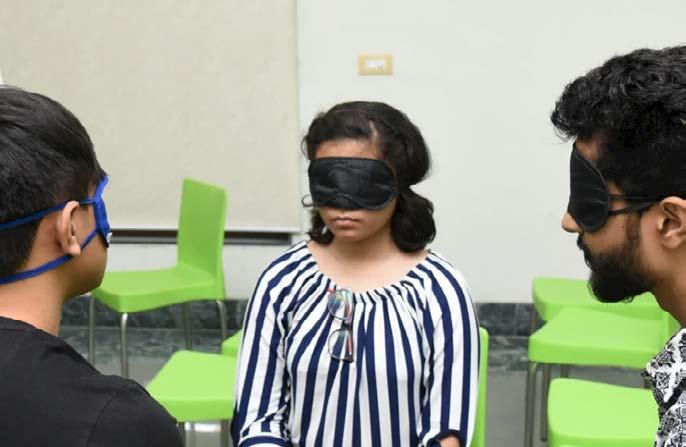
Samit Bhattacharyya, Associate Professor, Department of Mathematics, heads the Disease Modelling Laboratory. The projects employ mathematical models and computational methods to gain a comprehensive understanding of the interactions between the economy, infectious diseases, and human behavior. The data-driven models help unravel the intricacies inherent in the underlying phenomena. Many projects study cost, disparity, burden, and socio-economic status, and model behavior in poorer regions and countries.
Survival realities of footloose tribal migrants
Dr. Ajay Dandekar, Professor, Department of History, contributed a chapter that focuses on some key issues about the survival realities
Redesign of the traditional handloom
Dr. Prakash Kumar, Associate Professor, Department of Design received a research grant from the Department of Scientific
1https://transformingeducationsummit.sdg4education2030.org/unesco-world-education-leaderscall-environment-education-and-digital-access-be-part-learning-all
and Industrial Research (DSIR), Government of India for a project to redesign traditional handloom. The project aims to address occupational problems associated with traditional handlooms, which makes weaving a cumbersome and physically demanding task involving both legs and hands. Redesigning the traditional handloom would increase their efficiency, output, and hence the income for the weaver. Another important aspect is that of marginalized weaving communities who cannot buy a new system by discarding the present setup. The project is developing a set of lowcost accessories that can be fitted to existing traditional setups such that at a very small cost, weavers can increase their efficiency and income at the same time.
Influence of social structures on transnational migration duration: the case of Vietnamese contract workers returning from Taiwan
Limited previous studies about Vietnamese returned migrant workers reviewed that a relatively high rate of migrants returned home before their contract ended. This paper explores how the decisions to return were made under social lenses. The paper analyses data obtained through in-depth interviews of contract workers who had worked in Taiwan, focusing on Phu Tho province in Vietnam. The authors followed O’Reilly’s (2012) adaption of practice theory in migration research to examine a group of Vietnamese labor emigrants returning from Taiwan. Under this theory, external and internal structures are the two divisions of the social environment. The authors identified external structures that might enable or constrain migrant’s mobility. When negotiating internal structures, Vietnamese women might end their contracts early in response to family obligations. Originality/value: The findings provide insights into how women decide when to return, which may
3
contribute to a better understanding of how to assist women engaged in transnational labor migration. © 2021, Emerald Publishing Limited.
Phuong, Nguyen Quynh, and Sundar Venkatesh. “Influence of social structures on transnational migration duration: the case of Vietnamese contract workers returning from Taiwan.” International Journal of Sociology and Social Policy 42, no. 11/12 (2022): 984-1000.
Refugees
in South Asia: Political membership, nation-building projects and securitisation of human flows
This chapter is an attempt to explain the refugee situation in South Asia as we try to unpack how refugees are made, why they are seldom owned up by their home or host states, and the imperatives that guide the state’s gaze at them. In three interrelated arguments, we explain how refugees are part of the constitutive practice of modern South Asia. First, we show that the constitutive practises of South Asia, a deeply communitarian space, is the focal point of the creation and handling of refugees in the region. Second, the refugee situation is interlinked with the demo-cratic projects in South Asia which are experiencing a shift from civic to an ethnic conception of political membership. Intertwined with aspects of community, norms of citizenship, spectre of nationalism and the numerical impulses of democracy, the problem of the refugees in South Asia has continued to fester as the ethic of responsibility is weak. Along with this, the peculiar evolution of the norms of citizenship and the imperatives of nationmaking have turned the refugee a perennial other in most states. Finally, the increasing securitisation rather than humanisation of the category is an indicator of how refugees are viewed through the lens of security rather than human rights. © The Author(s), under exclusive license to Springer Nature Singapore Pte Ltd. 2022.
Chatterjee, Shibashis, and Udayan Das. “Refugees in South Asia: Political Membership, NationBuilding Projects and Securitisation of Human Flows.” In Internal Migration Within South Asia: Contemporary Issues and Challenges, pp. 27-49. Singapore: Springer Nature Singapore, 2022.
3 University Operations
Disability Support Cell
Shiv Nadar Institution of Eminence has constituted Disability Support Cell (ref. bod/2019-20/632, for compliance with the Honourable Supreme Court. Order No.292 of 2006) for the students with disabilities in the University. The objectives of the cell are to make the campus friendly for all students with disabilities, provide easy access to resources to the student, up to the extent possible, address problems or special needs, facilitate the academic and student life journey of a disabled student in the university, at the same time protect the confidentiality of students’ disability-related information.
All students have staff have access to the cell via office and contact email disability.support@snu.edu.in.
Financial Aid to deserving Candidates
The University is committed to helping deserving students such that finance is a smooth process in the educational journey of exceptional students. Based on eligibility criteria, the University offers Financial Aid and Scholarships to students selected through the specified admission criteria(s) in undergraduate programs, covering part or entire academic and living expenses.
Zero tolerance policy for gender insensitivity and sexual harassment
Shiv Nadar University is an inclusive workplace that has a zero-tolerance
policy for gender insensitivity and sexual harassment. We have an active Internal Complaints Committee (ICC) as per the University Grants Commission (UGC) guidelines prescribed by the law, which investigates complaints regarding sexual harassment within the University (considered as a workplace) and recommends appropriate action. At the beginning of the annual year, the ICC also undertakes sensitization programs for all incoming students, faculty, and non-teaching staff The University also has a full-time Gender Officer who works closely with the ICC. All students and staff have access to gender office through the gender officer or an email contact gendercommittee@snu.edu.in

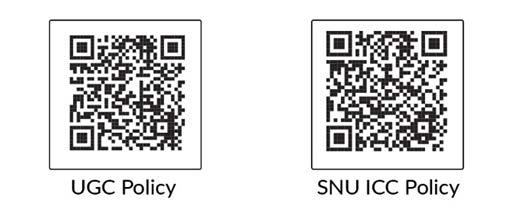
Celebrating diversity
At Shiv Nadar, we have a thriving student community, fully residential campus with students from 28 states. The university is a microcosm of India that reflects the country’s cultural diversity, talent, and perspectives. Fostering and appreciating the campus’s cultural, geographical, linguistic, and ethnic diversity. Embracing the nation’s variety and unity, the University hosts and celebrates many events and festivals to honor this diversity
4 Partnerships
Governance and Inequality
Dr. Yasmeen Arif, Professor, Department of Sociology, was invited by Grip Inequality as a visiting researcher. During her stay with GRIP in Bergen, Yasmeen worked
4
particularly with GRIP-affiliated senior researcher Bjørn Enge Bertelsen to address questions on identity and global intellectual labor. On another GRIP research project, she worked with Elina Troscenko on Political Protests and New Forms of Citizenship. Dr. Arif also lectured on Governance and Inequality at the Bergen Summer Research School.
Gender in Higher Education project (2021-23)
Shiv Nadar Institution of Eminence is part of an ongoing project, ‘Gender Equality in Higher Education in India’, led by Savitribhai Phule University Pune and Brunel University London.
This two-year research study is supported by the British Council and seeks to inform the National Education Policy (NEP) 2020 in the context of the achievements of higher education in gender equality. The team analyses issues of access, retention, campus climate, employability, leadership, and curricular and institutional practices in India, focusing on gender equality based on research conducted in ten higher educational institutions and across five states in India selected on the basis of the socio-economic diversity of the regions, gross
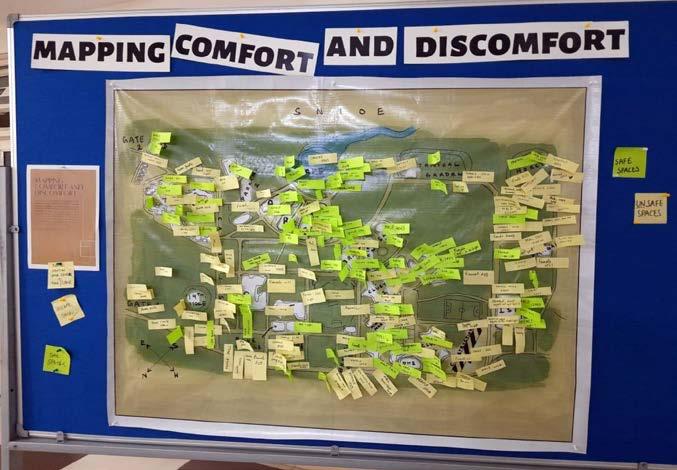
enrolment ratio and gender parity index. Dr. Sruthi Muraleedharan, Assistant Professor,
Department of International Relations and Governance Studies, and Dr. Divya Kannan, Assistant Professor, Department of History and Archaeology, are collaborating from Shiv Nadar.
Partnerships around Water Science and Policy program
The program of Water Science and Policy has a mandatory training on the field for a semester. In an attempt to understand and work on ground on various issues around water, one of the critical aspects that students become aware of is around access and accessibility to water. Inequalities around access and understanding it in context of local communities, culture and climate. Some of our partner organizations are Not -for-profit organizations, such as Development Support Center (DSC)2, Gram Vikas3, Samaj Pragati Sahayog (SPS)4, Advanced Center for Water Resources Development and Management (ACWADAM)5
Department of Design collaborates with AADI
Prakash Kumar, Associate Professor, Department of Design, is working in collaboration with Action for Ability Development and Inclusion (AADI) to propose design solutions to enable a user who uses a wheelchair to board and deboard a car with the least amount of effort. The project undertakes specific interventions
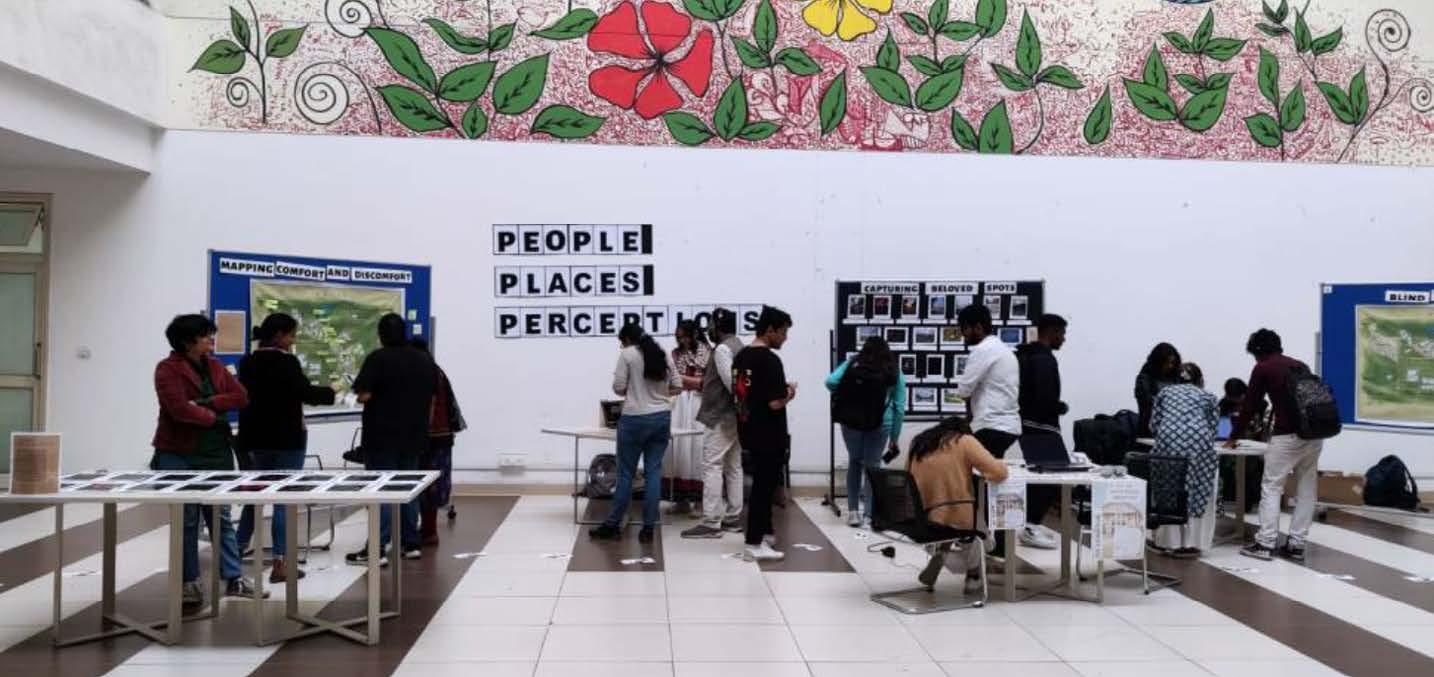
to address issues of accessibility faced by a girl with Cerebral Palsy (CP) and her single mother. The new intervention considers ergonomics, cost efficiency, ease of use, and the motor transport rules laid by the regional transport authorities. The new design can easily be fitted and detached in any car.
Governance and Inequality
Dr. Yasmeen Arif, from the Department of Sociology, is appointed visiting guest researcher at the Global Research Programme on Inequality (GRIP) and the Department of Social Anthropology, University of Bergen, Norway, in June 2022. She is also an affiliate in the GRIP project.
2Based in Ahmedabad, it provides knowledgebased support to institutions involved in promoting sustainable livelihood and participatory natural resource management.
3A NGO based in Odisha, works to enable rural communities to lead dignified lives. This is done by building the capabilities of village communities, strengthening community institutions, and mobilizing resources.
4One of India’s largest grass-roots initiatives working towards women empowerment, water and livelihood security.
5A not-for-profit organization, aims to establish groundwater management agenda in India with a mission to demystify ground water science and strengthen hydrogeological capacity of institutions working in water sector in India.
5
Shiv Nadar Institution of Eminence is fully committed to the UN Sustainable Development Goals (SDGs). We have embraced a four-pronged strategy for SDGs through teaching, research, our core institutional practices, and partnerships.
Deepa Hazrati Manager, Office of the Vice-Chancellor deepa.hazrati@snu.edu.in
 Shiv Nadar Institution of Eminence Gautam Buddha Nagar, Uttar Pradesh, India
Shiv Nadar Institution of Eminence Gautam Buddha Nagar, Uttar Pradesh, India







